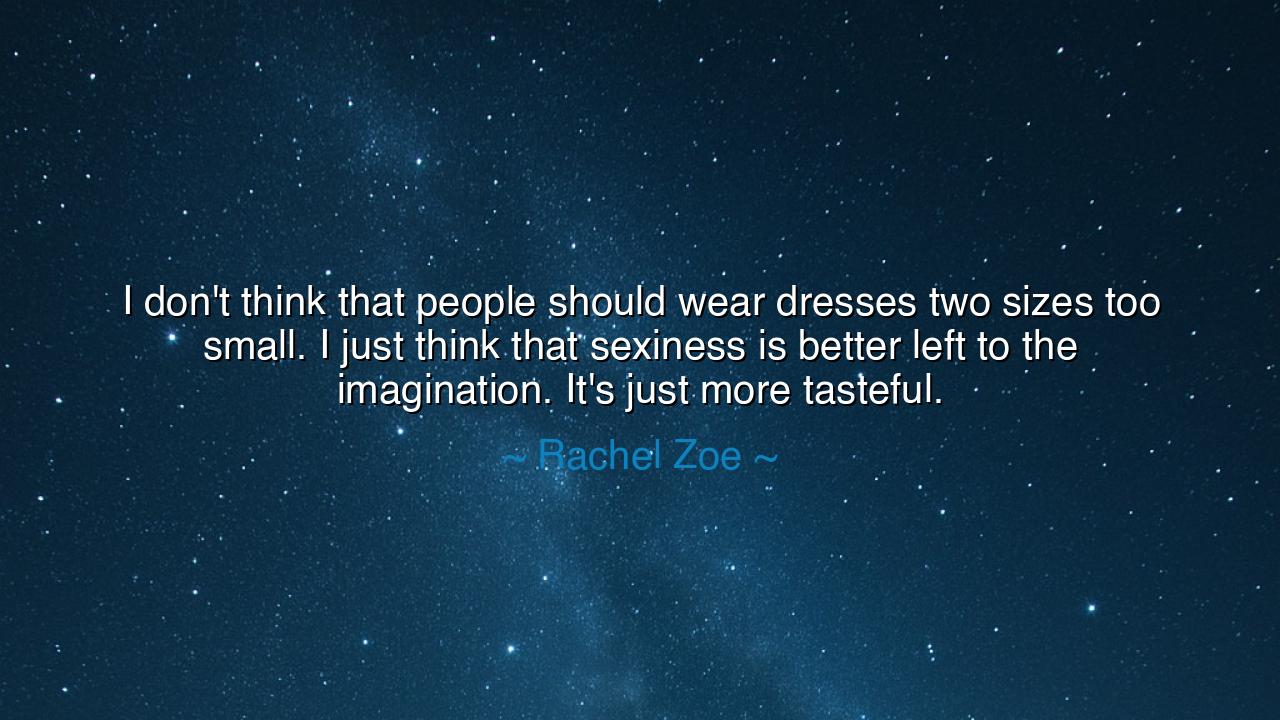
I don't think that people should wear dresses two sizes too
I don't think that people should wear dresses two sizes too small. I just think that sexiness is better left to the imagination. It's just more tasteful.






"I don't think that people should wear dresses two sizes too small. I just think that sexiness is better left to the imagination. It's just more tasteful." These words, spoken by Rachel Zoe, reflect a deep understanding of the delicate balance between confidence, taste, and mystery. In this statement, Zoe touches upon a profound truth—that sexiness, when revealed too easily, loses its power. True allure, she suggests, lies not in displaying every aspect of one’s body but in leaving space for the imagination. It is in restraint, in the subtlety of one’s presence, that true elegance and sophistication reside. By leaving something to the imagination, we invite others to engage not just with the visible, but with the unseen—the hidden essence of who we are.
In the ancient world, the concept of modesty was highly valued. The Greeks, for example, revered the idea of sophrosyne—a kind of balance and moderation that was reflected in both character and appearance. In their ideal society, beauty was not just about outward appearance but about harmony between body, mind, and spirit. In their art, sculptures of the gods were not overtly sexual, but dignified, embodying both strength and restraint. The human form, when depicted, was often modest, showing the beauty of proportion and balance rather than excess. The Greek ideal was not about showing all, but about representing the whole through a balanced, dignified approach. Zoe’s words echo this ancient wisdom—true beauty and sexiness are not about revealing all, but about creating a sense of mystery and elegance.
Consider the example of Athena, the goddess of wisdom and war, who was often depicted in ancient Greek statues with an air of dignity and restraint. She was not portrayed with exaggerated sensuality but with a sense of strength that transcended physical beauty. Her attire was not tight or revealing, but carefully draped, representing the virtue of moderation. Athena embodied the idea that true power comes not from provocation, but from self-possession and intellectual clarity. In much the same way, Zoe suggests that true sexiness is a reflection of one's inner strength and grace, not simply the act of revealing or displaying the body.
In more recent times, Audrey Hepburn is another example of this philosophy in practice. Hepburn’s beauty, while undeniable, was never about exposing herself or seeking attention through revealing clothing. She embodied elegance, sophistication, and mystery. Her most iconic roles, such as in Breakfast at Tiffany’s, were defined not by her physical appearance but by the charisma and grace she brought to her characters. Hepburn’s allure lay in her ability to captivate audiences without ever needing to show everything. Like Zoe, she understood that true sexiness lies in the unspoken, in the space between the obvious and the hidden, in the imagination of the viewer.
Zoe’s statement also touches upon the cultural shift we have witnessed in fashion over the past several decades. In an age where revealing clothing is often used as a shortcut to attract attention, the act of tasteful restraint can seem almost revolutionary. The overemphasis on showing more in order to be considered beautiful or desirable has led to a loss of mystery—and with it, the deeper, more profound form of allure. Zoe, in her wisdom, suggests that by dressing with a sense of dignity, by leaving something to the imagination, one cultivates not just sexiness, but class and elegance. True beauty is not in how much is shown, but in how much is felt beneath the surface.
The lesson here is one of balance and self-respect. In a world that often encourages us to seek external validation through appearance, it is important to remember that true sexiness and beauty arise from within. They are not the result of exposing oneself, but of self-assurance, restraint, and a commitment to personal integrity. When we allow others to see only parts of ourselves—whether in the clothes we wear, the words we speak, or the way we present our ideas—we invite them to engage with us in a deeper, more meaningful way. This mystery and restraint become a form of empowerment, allowing us to be seen for who we truly are, beyond the surface.
Let us take Zoe’s wisdom into our own lives, understanding that true elegance and allure are rooted in self-respect and moderation. In how we dress, how we interact with others, and how we live, we should remember that it is not about revealing everything to the world but about presenting ourselves with dignity and grace. When we leave something to the imagination, we not only protect our inner world but invite others to engage with us in a way that is more meaningful, more profound, and more lasting. True beauty comes from within, and it is through our restraint, our self-awareness, and our self-respect that we become truly captivating. Let us walk forward, then, with the understanding that the more we leave to the imagination, the more power and allure we hold.






AAdministratorAdministrator
Welcome, honored guests. Please leave a comment, we will respond soon